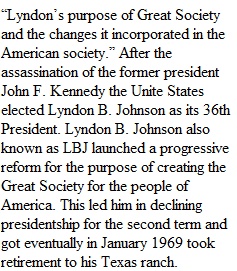


Q • The overall purpose of the modern civil rights movement was threefold: eliminate institutional forms of racism and segregation (de jure racism), eliminate racism within the culture (de facto racism), and secure economic opportunity and racial equity within the U.S. economy. Evaluate the extent to which these goals were achieved between 1945 and 1990. • There is considerable debate over what led to U.S. shortcomings and failings in the Vietnam War. Lack of clear objectives, having the wrong objectives, having objectives adverse to those of the Vietnamese people, poor military strategy, media coverage, and lack of political support at home have all been cited at various times as the reason for the eventual fall of South Vietnam to the communists. What do you see as the prevailing reason? • Lyndon B. Johnson’s Great Society represented the most significant legislative reform movement since the New Deal. In your essay, evaluate to what extent the Great Society represented a continuation Progressive politics, a continuation of New Deal politics, or represented another step for the role of government in American society, economy, and culture. (Be sure to use specific examples of particular Great Society programs and legislation in explaining your answer).
View Related Questions